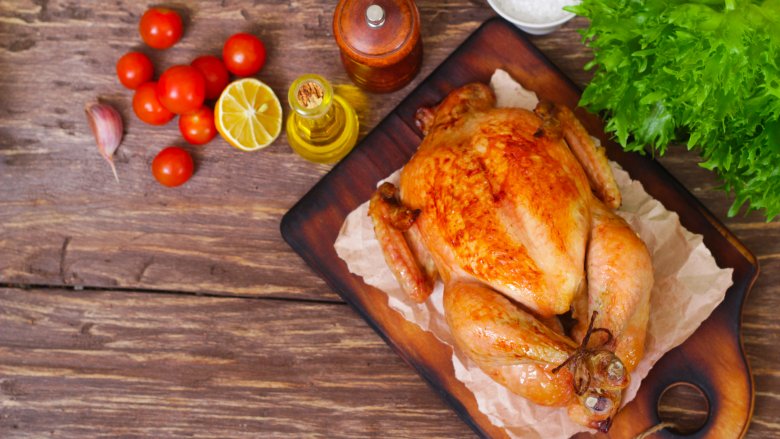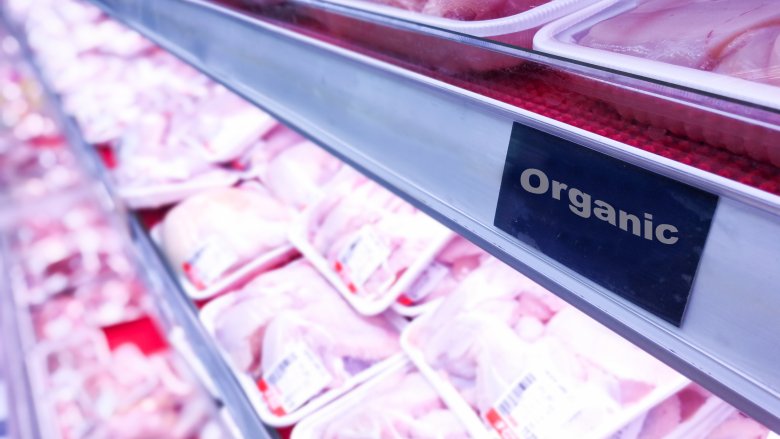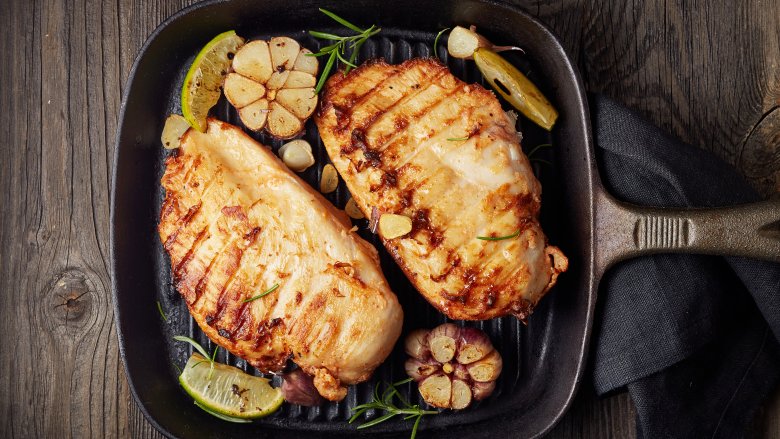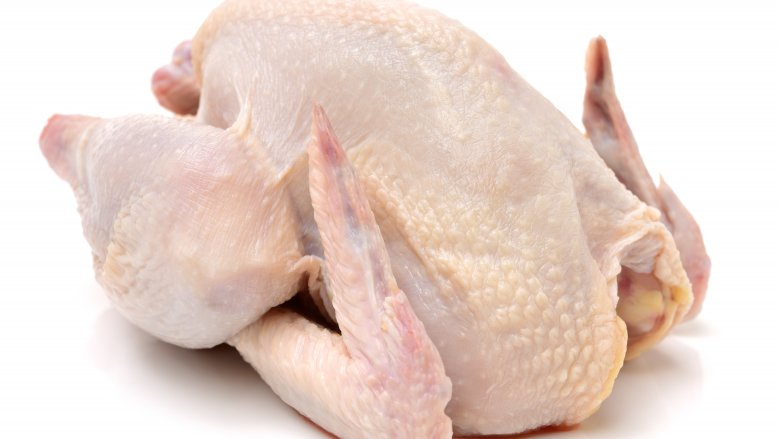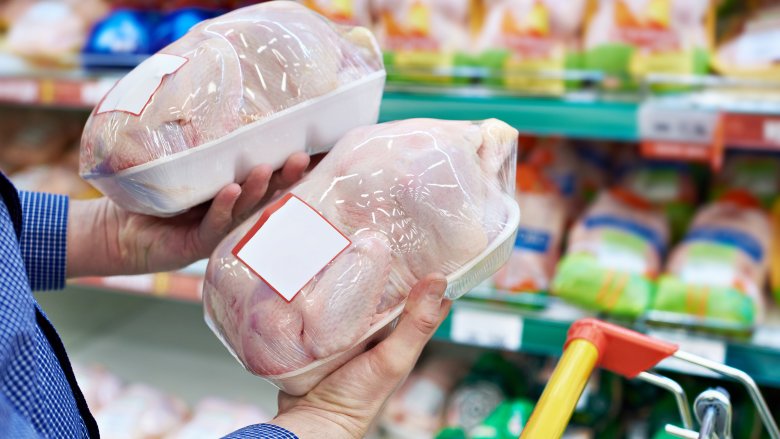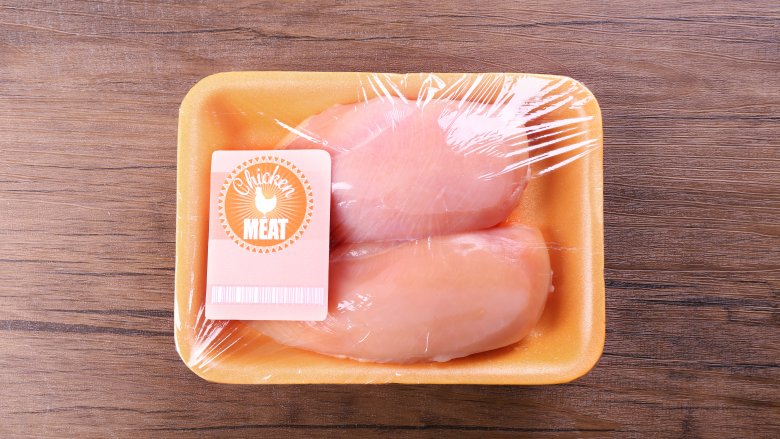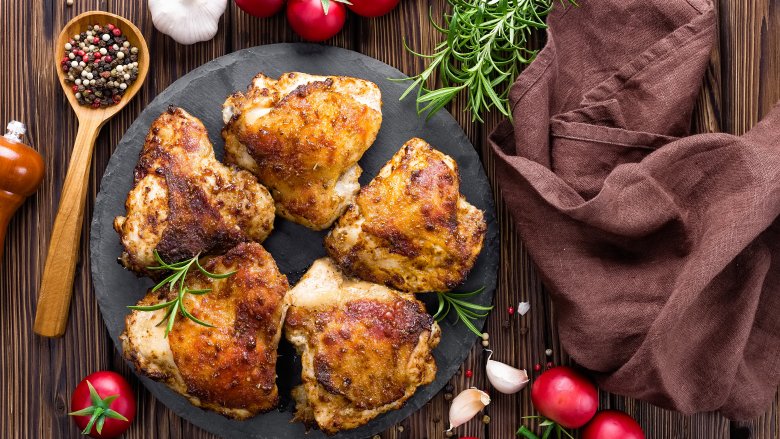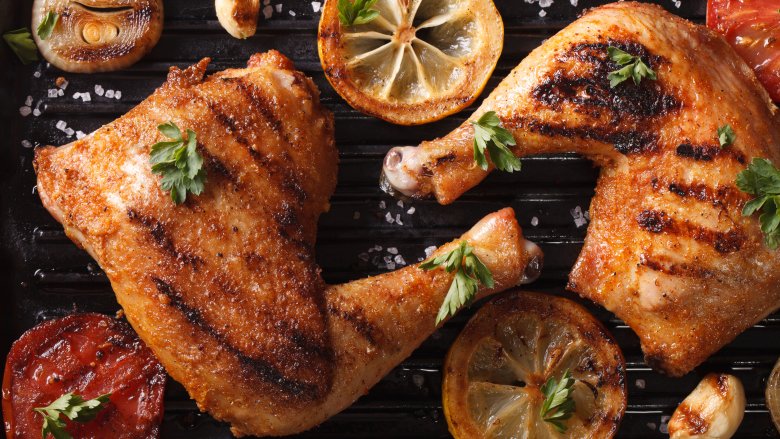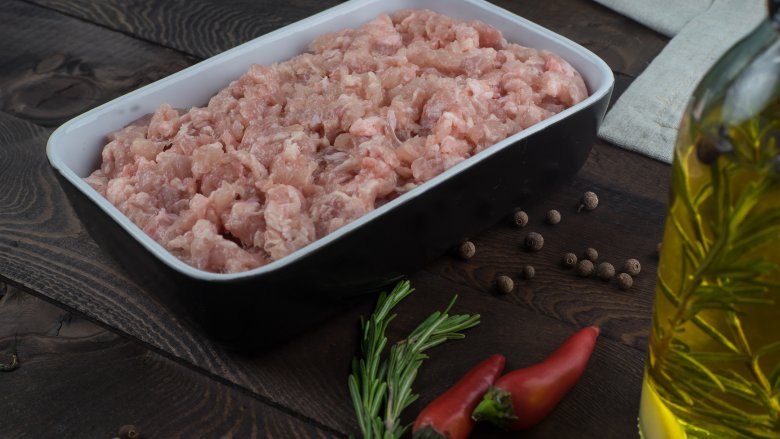Everything You Need To Know About Buying Chicken
If you've ever gone to the grocery store, butcher shop, market, or farm stand to buy chicken, you might have been intimidated by the offerings at least once or twice. Not only do you have to decide between the different cuts of chicken, but you also have to choose a brand and type of chicken. Organic? Cage free? What does it mean... and does it even matter?
It can be hard to decide what to buy, and from where. Of course you want the freshest, best-quality chicken, but you also don't want to waste your hard-earned money on overpriced meat. So how do you know where to start? If you're in need of a little bit of chicken buying advice, read on as these chicken experts break it all down. This is everything you need to know about buying chicken.
Know what good chicken looks like
Chicken is chicken is chicken, right? Not really. So what's it supposed to look like, anyway? "The skin should be a yellow tint, and the meat should be pinkish and natural-looking in cut or shape," Bart Pickens, executive chef at Party Fowl, said. Additionally, there really shouldn't be any particular scent to the chicken — if it has any odor, it's not good and you definitely shouldn't buy or eat it. "Fresh chicken should not have an odor, and should be plump and undamaged," Smith said. "Breasts should be pale pink with very little fat and dark meat should be dark pink with some white fat." If you know what chicken should look like and how it should (or, in this case, shouldn't) smell, you'll be able to make the right choices when faced with rows upon rows of chicken in the refrigerated case at the grocery store.
Know what to look for on the chicken's label
Reading the label carefully and knowing how to decipher the information can tell you quite a bit about the meat you're purchasing. According to chef Jehangir Mehta of Graffiti Earth, a New York restaurant focused on sustainability, one good thing to look for on chicken labels is the halal stamp — whether you need to seek it out for religious reasons or not. "The chickens are very fresh, and you'll be able to sleep soundly at night knowing that your chicken was farmed humanely and responsibly," Mehta said. He also recommended looking for grass-fed chicken, rather than chicken that was fed corn or other feeds.
Additionally, Frank Sanchez, the executive chef at Chicago Marriott Downtown Magnificent Mile stressed the importance of buying chicken that's as natural as possible, meaning there weren't any additional ingredients added during any part of the process before the chicken gets to your store. Scour the packaging to make sure that you really know what's in your chicken and, if possible, how it was processed.
That fresh label on your chicken means more than you think
Though buying large quantities of frozen chicken is easy and convenient, it's not going to result in the tastiest meat. For that, you want chicken that's fresh — meaning it's never been frozen.
Chicken that's labeled as "fresh" has never had an internal temperature below 26 degrees Fahrenheit, which is the freezing temperature for poultry. Why does that matter? Well, freezing and thawing can change the texture of foods and chicken is no exception. "Much of that grocery store chicken is frozen during transport, then thawed before it hits the shelves," Brian Smith, co-owner of The Butchery said. "Once chicken is frozen, it eats differently, and can typically only be frozen/thawed once. The texture and water content are noticeably impacted."
Free-range chicken makes a difference
"Free-range" is a popular choice among chicken buying experts. According to the USDA's Food Safety and Inspection Service, chicken can be labeled as "free-range" if the producer can prove to the USDA that the chickens have been given access to the outdoors. You might think it's just a chicken buzzword, but for some chefs, it's more than that. "The more humane the chickens are raised and butchered, the less stress they endure and thus the more pristine their meat will be," said KYU's chef Michael Lewis. "Low stress plus good diet equals healthy. Holds true for all of us."
Frank Sanchez, the executive chef at Chicago Marriott Downtown Magnificent Mile, said he also prioritizes free-range birds. "Free range is desirable because over-populating chickens causes the chickens to become stressed out and you can taste that stress in your poultry." For what some chefs feel is the best-tasting chicken, opt for free-range.
Pasture-raised chicken doesn't mean much
There are a lot of terms that vaguely sound like they mean the same thing, like free-range and pasture-raised. Turns out, they're pretty different. The term "pasture-raised" does not require extra labeling by the USDA, according to HuffPost, so be wary whenever you see that label as there's no real official definition as to what that actually entails. If you're really looking for chicken that spent some time outdoors, free-range is your best bet. "Farm-raised" labels are just as vague, since most chickens are raised on farms — though the type of farms vary greatly.
Hormone labels on chicken are unnecessary
Another buzzword you'll often see on labels of your poultry is "hormone-free." While it might make it seem like that particular chicken is healthier and more natural than other options, it's probably not. The FDA hasn't approved the use of hormones for raising any type of birds (or pigs) that will be used for food, so the hormone-free label is completely unnecessary. All chicken legally sold in the US is hormone-free. If it appears on the label, it's pretty much just a marketing tool.
Antibiotics in your chicken might matter
Antibiotics, on the other hand, absolutely can be added to poultry, but many feel you should avoid them if possible. "No antibiotics added" can, according to the USDA, be added to the label of chicken products so long as the producer can provide proper documentation proving it's true.
According to Mother Jones, both the FDA and CDC blame antibiotic use in farm animals as a reason for growing human resistance to the drugs, but it's only recently that the FDA has begun to set any regulations about their use. This means it's up to you to make a decision about antibiotics in your chicken — and to check the label carefully if you opt to avoid it.
The organic debate when it comes to chicken
If the chicken is labeled as certified organic, that means that it's been certified to meet the qualifications that the USDA has set for organic products. Buying organic products can help your family avoid synthetic pesticides, sewage, genetic engineering, and more, as well as making strides toward sustainability and conservation. There is a fee associated with the certification process, which is one reason why organic meats are often more expensive. Some producers feel as though they go above and beyond the organics standards, yet aren't certified due to costs and other issues.
The benefits of buying organic chicken are pretty debatable. While one chef told Reuters that it's nearly impossible to distinguish the taste of an organic chicken from a non-organic one, Food 52 claims the different eating habits of organic chickens result in tastier meat. Whether or not organic chicken is a healthier option is also highly debated by scientists and nutritionists alike, meaning the decision really comes down to your personal preference. Read the labels, and make sure you're getting what you think you are.
Yes, the chicken is graded
Have you ever noticed letter grades on the chicken at the grocery store? There are three letter grades the USDA uses in regards to poultry: A, B, and C. When you're shopping, look for Grade A. According to the USDA, Grade A chicken doesn't have any deformities, is well-fleshed, there's a generous layer of fat, there aren't any feathers or hairs still attached to the outside of the chicken, and there aren't any cuts or tears in the skin or flesh, broken bones, or discolored portions. Grades B and C, on the other hand, have increasing deformities and other issues, making them a less-than-ideal choice for your family's dinner table in nearly every instance.
Don't discount dark meat chicken
If all you ever buy is boneless, skinless chicken breasts, you're missing out on a lot. "When seeking chicken, I recommend always going with thighs over another part of the bird," chef Jehangir Mehta said. "It's the most tender, flavorful, and really versatile! The number of dishes you can create with the thigh as opposed to the breast or wings is really incredible." Chicken thighs can be prepared in practically any way with practically any flavor profile, so while you might think your family will only eat plain-Jane boneless, skinless chicken breasts, if you take a chance on chicken thighs, you might be surprised at just how delicious they can be.
Pay attention to chicken's processing
You might not realize that the way the chicken you're buying has been processed is important, but it matters more than you think. "I want my chicken to be cut by a knife not 'mechanically separated' [because] this is a high pressure way of separating meat from bone that mixes other not so nice items into one 'chicken paste,'" said Frank Sanchez, the executive chef at Chicago Marriott Downtown Magnificent Mile.
Additionally, you can save some money — and a little bit of peace of mind — if you do a little bit of the processing yourself. "When you buy a whole bird and break it down yourself, you'll get more for your money and better portion sizes," Bart Pickens, executive chef at Party Fowl, said. Learning how to break a whole chicken down into pieces is an invaluable skill and it's easier than you probably think.
Talk to the butcher when you buy chicken
It sounds basic and almost makes too much sense, but if you want to buy the best quality chicken and get the best deals for it, you should be chatting up the butcher wherever you buy your meat. "If you shop for chicken at your local butcher shop, you have the opportunity to ask your butcher questions beyond what is shown on the label at a typical grocery store, such as whether it is all-natural, non-GMO, organic/free range, etc," Brian Smith, co-owner of The Butchery, said. "Beyond that label, you can find out what farm the chicken was raised on, and whether it was ever frozen." Shopping at small, local businesses where the butchers have relationships with the farmers and can form a relationship with you too can help you feel certain that you're buying responsibly.
Beyond that, as registered dietitian Vanessa Rissetto said, the butcher at some grocery stores will have a good idea of which cuts are the freshest, which are the best bang for your buck, and which are on sale that day. Talking to — and building a relationship with — your local butchers can make buying chicken simple.
DIY the grind
Rather than buying the pre-ground meat that's sold in refrigerated cases at the grocery store, find whatever is freshest and works with what you want to make and then take it to the butcher counter and have the butcher grind it for you. Most butchers will grind it for you without too much of a problem. Registered dietitian Vanessa Rissetto said that with pre-ground meats, you're not sure exactly where the meat is coming from, how many animals it's made up of, if it's been frozen before, or the quality of those animals it's made up of.

